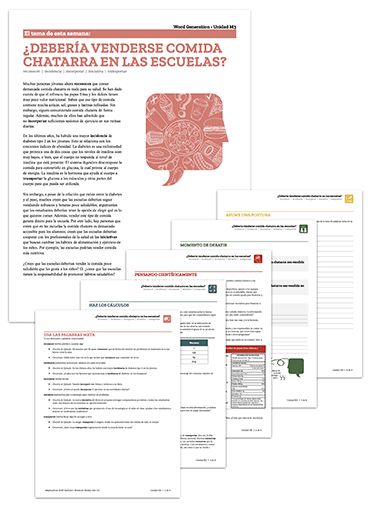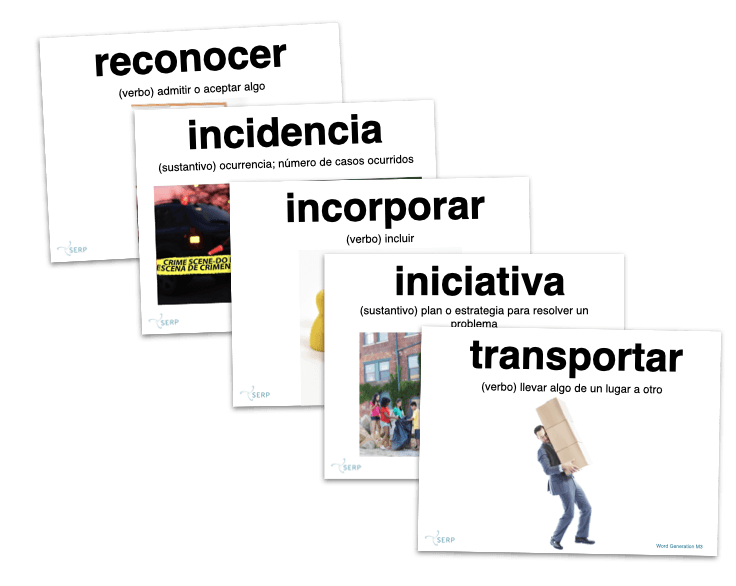Adaptation of WordGen Weekly Units for Use in Mexican Schools
About the Project
In 2018, Dr. Catherine Snow, Harvard Graduate School of Education (HGSE), and Dr. Silvia Romero-Contreras, Universidad Autónoma de San Luis Potosí, México (UASLP), sought funding to adapt the Word Generation strategy for use in Mexican public schools. With funding from the Mexico Innovation Fund from the David Rockefeller Center, the UASLP team adapted 11 units in order to provide research-based curricular resources promoting argumentation, perspective-taking, academic language, and discussion to schools in Mexico. In 2019, bilingual Spanish-English Word Gen experts traveled to Mexico to train several teachers and student-teachers on the new materials, which were piloted during two consecutive school years.
These resources are adaptations of some of the units in WordGen Weekly program and do not represent translations that can be used side-by-side with the English versions in dual language classrooms.
Eleven Units Now Available
- Student Materials
- Teacher Editions
- Vocabulary Cards
- Program Introduction for Teachers
Go to serp.link/wordgen-mexico for free PDF downloads.
Word Generation México


More About the Adaptation Process
The adaptation of Word Generation materials for use in Mexican public schools involved several steps.
Topic Relevance
The first step in the adaptation process was to analyze the existing WordGen Weekly units to select those with relevant topics for Mexican students. While most units refer to current topics within the interest of adolescents, some were considered not culturally appropriate because they refer to local U.S. situations (i.e., Unit 1.03: What makes an American?), because the topic discussed has had a very different history in Mexico than in the U.S. (i.e., Unit 1.07: Censorship: Who should decide what young people read?), or because some of the issues discussed are not of central importance for Mexican teens attending public schools (i.e., Unit 2.04: Do professional athletes deserve multi-million dollar salaries?). While many units met the selection criteria, we had to narrow our selection down to just a few units (eleven, due to budget and time constraints) considering different domains of interest. The units adapted so far are:
| Word Generation México Unit Titles | Adapted from: |
|---|---|
| 1. ¿Por qué vamos a la escuela? | 1.01 What is the purpose of school? |
| 2. ¿Cuándo alguien debería ser considerado un adulto? | 1.02 When should someone be considered an adult? |
| 3. ¿Debería venderse comida chatarra en las escuelas? | 1.12 Junk food: Should schools sell it? |
| 4. ¿Las drogas deberían ser legalizadas? | 1.18 Should drugs be legalized? |
| 5. Violencia de pareja: ¿Cuándo debería llamar a la policía? | 1.24 How should teen dating violence be addressed? |
| 6. La escuela o los padres: ¿Quién es responsable de la educación sexual? | 2.03 Should schools or parents be responsible for sex education? |
| 7. ¿Los niños deben intervenir para prevenir el acoso escolar? | 2.12 Are kids responsible for stepping in to prevent bullying? |
| 8. ¿Vale la pena invertir en tecnologías ecológicas? | 2.15 Are green technologies worth the investment? |
| 9. ¿Debe ser la escuela un lugar para debatir? | 3.01 Should school be a place for debate? |
| 10. ¿Deberíamos regular el uso del papel o del plástico? | 3.02 Should our use of paper or plastic be regulated? |
| 11. ¿Cuándo está bien mentir? | 3.19 When is it okay to lie? |
After the selection process, we revised, adapted and translated the selected units considering several aspects:
Adequacy of the target words in each unit
We revised the target words considering whether the translated word is used in academic contexts in Spanish, the scope of the meaning of the word to address the topic in question, and the relevance of the image used to represent the word. All translated words met the first criterion. However, in a few cases, an English target word had to be translated into two Spanish words to convey its full meaning (i.e.,
factor
in English
for
factor and
considerar
in Spanish; the latter was added to include the sense of
factor in). Some images had to be replaced with more culturally appropriate ones.
Cultural relevance of the data presented
Since the units are designed to encourage genuine reflection and discussion, the texts refer to relevant information in the context of the students. So, in most cases, content changes had to be made to convey relevant information to Mexican students. The introductory texts, as well as the math and science problems, were revised in order to identify any local U.S. information, which was replaced by Mexican data when available or by Latin American data.
Some units required extensive changes on the initial reading piece as the topic was presented with mostly local information. This was the case of the original introductory passage in Unit 1.18, which deals with the issue of drug legalization by discussing the history of the alcohol and drug legalization debate in the U.S., beginning with a reference to President Nixon's war on drugs. In the adapted version, the same topic is discussed using Mexican facts, referring, for example, to a period of temporary legalization of drugs in Mexico declared by president Lázaro Cárdenas. See the first paragraph of the initial reading in each version below:
Original
In 1971, President Nixon declared a “war on drugs.” He called for stricter policies and increased enforcement by police, which led to more arrests and harsher punishments. Although studies indicate similar rates of drug use across races, the enforcement of these policies has disproportionately targeted communities of color. Decades later, many are saying the “war on drugs” has been lost.
Adapted
El consumo de drogas en México fue temporalmente legal. En 1940 el entonces presidente Lázaro Cárdenas promulgó el Reglamento Federal de Toxicomanías. Este reglamento eliminaba algunas de las sanciones impuestas para quienes consumían drogas. Además, consideraba a quienes tenían problemas con estas sustancias como personas enfermas en lugar de criminales. La venta de drogas se realizaba en dispensarios que estaban a cargo del entonces departamento de Salubridad Pública del gobierno, así que la venta en comercios no autorizados seguía siendo ilegal.
Many units use local statistical data for the reading or the math and science problems. In all these cases, the adaptation consisted of finding similar data to replace the original data and adjusting the content accordingly. For example, in Unit 2.12: Are kids responsible for stepping in to prevent bullying?, one of the math problems in the English version includes statistics on the percentage of students who reported being bullied in the U.S. in a specific period, which was replaced with similar data from Mexico, while keeping the purpose of the math problem at the same level (see below).
Original
The National Center for Education Statistics reported that in 2011, 28% of students aged 12–18 reported being bullied in the past year. If this is still true today, and three students are chosen at random, what are the chances that at least one of them has been bullied in the past year?’
Adapted
México es el país con mayores índices de acoso escolar a nivel mundial. Un estudio realizado entre 2017 y 2018 por la ONG International Bullying sin Fronteras para América Latina y España, reportó que en México 7 de cada 10 niños sufren todos los días algún tipo de acoso. ¿Cuál es el porcentaje de niños que sufría acoso? ¿Cuántos niños sufrían algún tipo de acoso en una escuela con una población de 450 estudiantes?
Other minor adjustments were also common. For example, some units included well-known brands in the U.S. All these were changed to generic terms in order to avoid branding. Also, all measurement units were changed to the decimal metric system, which is the one used in Mexico.
Development of Word Generation was led by Catherine Snow (Harvard University) and Suzanne Donovan (SERP). Major SERP contributors to program development include: Claire White, Alyse Krantz, Halley Wheeless, Matt Ellinger, David Dudley, and Patrick Hurley. Boston Public Schools and other districts in Massachusetts and Maryland collaborated with SERP to develop Word Generation.
Support for Word Generation was provided by the Carnegie Corporation of New York, the William and Flora Hewlett Foundation, the Noyce Foundation, the Spencer Foundation, the Leon Lowenstein Foundation and the Institute of Education Sciences, U.S. Department of Education through grant numbers R305A090555 and R305F100026. The information provided does not represent views of the funders.
